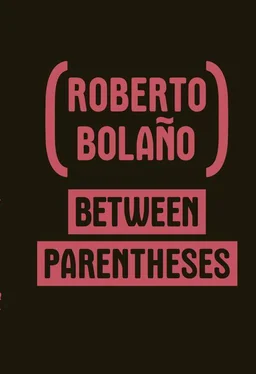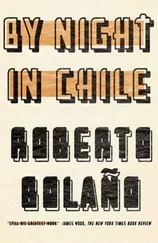Roberto Bolaño - Between Parentheses - Essays, Articles and Speeches, 1998-2003
Здесь есть возможность читать онлайн «Roberto Bolaño - Between Parentheses - Essays, Articles and Speeches, 1998-2003» весь текст электронной книги совершенно бесплатно (целиком полную версию без сокращений). В некоторых случаях можно слушать аудио, скачать через торрент в формате fb2 и присутствует краткое содержание. Год выпуска: 2011, Издательство: New Directions, Жанр: Публицистика, Критика, на английском языке. Описание произведения, (предисловие) а так же отзывы посетителей доступны на портале библиотеки ЛибКат.
- Название:Between Parentheses: Essays, Articles and Speeches, 1998-2003
- Автор:
- Издательство:New Directions
- Жанр:
- Год:2011
- ISBN:нет данных
- Рейтинг книги:4 / 5. Голосов: 1
-
Избранное:Добавить в избранное
- Отзывы:
-
Ваша оценка:
- 80
- 1
- 2
- 3
- 4
- 5
Between Parentheses: Essays, Articles and Speeches, 1998-2003: краткое содержание, описание и аннотация
Предлагаем к чтению аннотацию, описание, краткое содержание или предисловие (зависит от того, что написал сам автор книги «Between Parentheses: Essays, Articles and Speeches, 1998-2003»). Если вы не нашли необходимую информацию о книге — напишите в комментариях, мы постараемся отыскать её.
The Savage Detectives
Between Parenthese
Between Parentheses: Essays, Articles and Speeches, 1998-2003 — читать онлайн бесплатно полную книгу (весь текст) целиком
Ниже представлен текст книги, разбитый по страницам. Система сохранения места последней прочитанной страницы, позволяет с удобством читать онлайн бесплатно книгу «Between Parentheses: Essays, Articles and Speeches, 1998-2003», без необходимости каждый раз заново искать на чём Вы остановились. Поставьте закладку, и сможете в любой момент перейти на страницу, на которой закончили чтение.
Интервал:
Закладка:
NICANOR PARRA AND GOODBYE TO CHILE
My friend Marcial Cortés-Monroy takes me to visit Nicanor Parra. As far as I’m concerned, Parra has long been the best living poet in the Spanish language. So the visit makes me nervous. It makes no sense when you think about it, but the truth is that I’m nervous: at last I’m going to meet the great man, the poet who sleeps sitting in a chair, though his chair is sometimes a flying chair, jet-propelled, and sometimes a chair that drills down into the earth, but anyway, I’m going to meet the author of Poems and Antipoems , the most clear-sighted resident of this island-corridor that is strolled from end to end by the ghosts of Huidobro, Gabriela Mistral, Neruda, de Rokha, and Violeta Parra, looking in vain for a way out.
We’re met at the door by Corita. A bit wary, Corita, though you can see she isn’t a bad person. Then we’re left alone and soon we hear footsteps approaching the living room. Nicanor comes in. His first words, after he greets us, are in English. It’s the welcome Hamlet receives from some peasants of Denmark. Then Nicanor talks about old age, about Shakespeare’s fate, about cats, about his first house in Las Cruces, which burned down, about Ernesto Cardenal, about Paz, whom he values more as an essayist than a poet, about his father, who was a musician, and about his mother, who was a seamstress and made shirts out of scraps for him and his siblings, about Huidobro, whose tomb on the other side of the bay, above a forest, is visible from the balcony, a white spot like bird shit, about his sister Violeta and her daughter Colombina, about loneliness, about a few afternoons in New York, about car accidents, about India, about dead friends, about his childhood in the south, about Corita’s mussels, which really are very good, about Corita’s fish with mashed potatoes, which is also very good, about Mexico, about Dutch Chile and the Mapuches who fought on the side of the Spanish crown, about the university in Chile, about Pinochet (Nicanor is prophetic regarding the judgment of the House of Lords), about new Chilean fiction (he speaks highly of Pablo Azócar and I’m in complete agreement), about his old friend Tomás Lago, about Gonzalo de Berceo, about Shakespeare’s ghosts and Shakespeare’s madness (always visible, always circumstantial), and I listen to him talk — live — and then I watch a video of him talking about Luis Oyarzún and I feel like I’m falling into an asymmetrical well, the well of the great poets, where all that can be heard is his voice gradually mingling with other voices, and I don’t know who those other voices belong to, and I also hear footsteps echoing through that wooden house as Corita listens to the radio in the kitchen and hoots with laughter, and Nicanor goes up to the second floor and then comes down with a book for me (the first edition of which I’ve owned for years; Nicanor gives me the sixth) that he inscribes, and then I thank him for everything, for the book that I don’t tell him I already have, for the food, for the very pleasant few hours that I’ve spent with him and Marcial, and we say hasta luego though we know it isn’t hasta luego , and then the best thing is to get the fuck out of there, the best thing is to find a way out of the asymetrical well and hurry silently away as Nicanor’s steps echo up and down the corridor.
The Corridor With No Apparent Way Out
It’s strange to come back to Chile, the corridor country, but when you think twice (or even three times) about it, it’s strange to come back anywhere. Assuming, of course, that you’re really back, and not dreaming that you’re back. It was twenty-five years before I came back. The streets actually seemed the same as always. The faces, too. Which can spell deadly boredom or madness. So this time, for a change, I decided to keep calm and wait and see what would happen, sitting in a chair, which is the best place to keep a corridor from surprising you.
One day I was invited to dinner at the house of a government minister. The chance of a lifetime to write an in-depth article on power. Actually, I was invited to dinner at the house of the writer Diamela Eltit, whose lover or partner, or anyway the man she lived with, was the Socialist minister Jorge Arrate, spokesman of the Frei government. That was enough to make anybody nervous. Our friend Lina Meruane came to pick us up at eight at the hotel where we were staying and off we went.
First surprise: the neighborhood where Eltit and Arrate live is a middle-middle class neighborhood, not upper class or upper-middle class. The kind of neighborhood that produced the illustrious (and not so illustrious) gladiators of the seventies. Second surprise: the house is relatively small and not ostentatious at all, not the kind of house where one expects a Chilean minister to live. Third surprise: when we get out of the car I scan the street for the unmarked car driven by the minister’s bodyguard and I don’t see it.
Many hours later, when I ask Jorge about his bodyguards, he says he doesn’t have any. What do you mean you don’t have any? I ask. I just don’t, he says, Diamela doesn’t like bodyguards and anyway they’re a nuisance. But is it safe? I ask. Jorge Arrate is well-acquainted with persecution and exile and he knows that no one is ever safe. Diamela glances at him. We’re at the table, eating the dinner that Jorge personally prepared. There’s no meat. Someone in the house is a vegetarian and presumably he or she has imposed the diet on everyone else. In any case, it’s Jorge who cooks and he does a fine job. I enjoy vegetarian food the way I enjoy a kick in the stomach, but I eat what they put in front of me. Diamela looks at Jorge and then she looks at my wife, Carolina, and then at Lina and at the novelist Pablo Azócar, the fifth guest, and she doesn’t look at me. I get the sense she doesn’t like me. Or maybe she’s very shy. Anyway. The truth is, all I can think about right now is a band of Nazis bursting into the house to kill the minister and along the way killing my wife and my son, Lautaro (who hasn’t come to the table and is asleep in a room with the TV on). And what if those bastards from Patria y Libertad turn up? I ask. I hope they don’t, says Jorge, so calmly it makes my hair stand on end.
This is no country for me, I think.
That morning, Jorge Arrate went out all by himself to shop for provisions for dinner. It’s clear at a glance that he hasn’t gotten rich as a minister under Frei. I think he was a minister in the Aylwin government too. I’m not sure. What I do know is that he hasn’t gotten rich. Still, as he waited patiently in line to pay for his lettuce and tomatoes, some kids who probably weren’t even born when he was already a political exile started chanting “yellow, yellow, yellow.” Other times, of course, what they yell (different kids, horribly vulgar women) is “red, red.” So what did you do when they called you yellow? I asked. Nothing, what could I do? said Jorge. Take the two slurs together, I tell him, and you’d have the Spanish flag. Jorge doesn’t hear me. He’s telling my wife the story of an independent candidate in the first democratic elections who, in the name of equal opportunity, was allotted fifteen seconds of free advertising space on television. The candidate had decided to say only her name. But then she wasn’t even given enough time for that. She said her name, but so fast that you could hardly understand her, the whole thing reduced to a short and desperate squawk.
The surprising thing is that the candidate won, which gave the big party strategists and advertising people much food for thought. Anyway, says Jorge, as if to play down this — and any other story — the point is that soon afterward the independent candidate joined a party on the far right.
Читать дальшеИнтервал:
Закладка:
Похожие книги на «Between Parentheses: Essays, Articles and Speeches, 1998-2003»
Представляем Вашему вниманию похожие книги на «Between Parentheses: Essays, Articles and Speeches, 1998-2003» списком для выбора. Мы отобрали схожую по названию и смыслу литературу в надежде предоставить читателям больше вариантов отыскать новые, интересные, ещё непрочитанные произведения.
Обсуждение, отзывы о книге «Between Parentheses: Essays, Articles and Speeches, 1998-2003» и просто собственные мнения читателей. Оставьте ваши комментарии, напишите, что Вы думаете о произведении, его смысле или главных героях. Укажите что конкретно понравилось, а что нет, и почему Вы так считаете.












